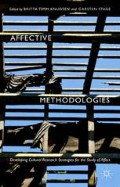Abstract
Studies of political art and art activist practices often focus on representations and expect that art, in a clear-cut manner, provides a critique of, for instance, various forms of suppression. Yet practice often transgresses representational patterns, disciplinary boundaries, and traditional notions of the art-work. In this chapter I develop an affectively oriented methodological framework for investigating art political practices, the effect of which cannot merely be perceived as a matter of representation. The methodology relies on an understanding, not of the art-work as a coherent category, but of the net-work that emerges as an open-ended assemblage (Latour, 2005; Delanda, 2006; Anderson et al., 2010). The focus on the net-work has implications for the study of political art and affect. Because when the focus is the net-work, affect cannot be studied and identified on its own. Affect must be identified in the ways in which the net-work materializes.
Access this chapter
Tax calculation will be finalised at checkout
Purchases are for personal use only
Preview
Unable to display preview. Download preview PDF.
References
Ahmed, S. (2004) The Cultural Politics of Emotion. Edinburgh: Edinburg University Press.
Ahmed, S. (2010) ‘Orientations Matter’, in Cole, D. and Frost, S. (eds) New Materialisms: Ontology, Agency, and Politics. Durham: Duke University Press.
Anderson, B., M. Keanes, C. McFarlane, and D. Swanton (2012) ‘On Assemblages and Geography’. Dialogues in Human Geography, 2(2), 171–189.
Bennett, J. (2010) Vibrant Matter. A Political Ecology of Things. Durham: Duke University Press.
Bishop, C. (2012) Artificial Hells. Participatory Hells and the Politics of Spectatorship. London and New York: Verso.
Castells, M (2009) Communication Power. Oxford and New York: Oxford University Press.
Cole, D. and Frost, S. (eds) New Materialisms: Ontology, Agency, and Politics. Duke University Press.
Conner, M. and Manovich, L. (2013) ‘Software Takes Command: An Interview with Lev Manovich’, Rhizome, http://rhizome.org/editorial/2013/jul/10/lev-manovich-interview/. Accessed July 15, 2013.
Couldry N. (2012) Media, Society, World. Social Theory and Digital Media Practice. Cambridge and Maiden: Oxford University Press.
DeLanda, M. (2006) A New Philosophy of Society. Assemblage Theory and Social Complexity. London and New York: Continuum.
Deleuze, G and Parnet, C. (1977) Dialogues. New York: Columbia University Press.
Foster, H. (1996) The Return of the Real. Cambridge: The MIT Press.
Groys, B. (2008) Art Power. Cambridge: MIT Press.
Harraway D. (1988) ‘Situated Knowledges: The Science Question in Feminism and the Privilege of Partial Perspective’. Feminist Studies, 14(3), 575–599.
Hands, J. (2011) @ is for Activism: Dissent, Resistance and Rebellion in a Digital Culture. London: Pluto Press.
Hepp, A. (2013) Cultures of Mediatization (2nd edition). Cambridge and Maiden: Polity.
Lash, S. and C. Lury (2007) The Global Culture Industry. Cambrigde and Maiden: Polity Press.
Latour, B. (2005) Reassembling the Social. An Introduction to Actor-Network Theory. Oxford: Oxford University Press.
Law, J. (2004) After Methods — Mess in Social Science Research. New York: Routledge.
Leys, R. (2011) ‘The Turn to Affect. A Critique’. Critical Inquiry, 37, 434–472.
Massumi, B. (2002) Parables for the Virtual. Durkham and London: Duke University Press.
Massumi, B. (2009) ‘Micropolitics: Exploring Ethico-Aesthetics’. Inflexions: A Journal for Research-Creation, 3, http://www.senselab.ca/inflexions/volume_3/node_i3/massuml_en_inflexions_vol03.html. Accessed 13 January 2010.
Papastergiadis, N. (2012) ‘Can there be a history of contemporary art?’ Discipline, 2.
Rancière, J. (2010) Dissensus. On Politics and Aesthetics. London and New York: Continuum.
Rutten, R., Dienderen, A.v. and Soetaert, R. (2013) ‘Revisiting the Ethnographic Turn in Contemporary Art’. Critical Arts: South-North Cultural and Media Studies, 27(5), 459–473, DOI: 10.1080/02560046.2013.855513. Accessed October 15, 2014.
Wetherell, M. (2012) Affect and Emotion. A New Social Science Understanding. Los Angeles, London, New Delhi, Singapore, Washington DC: Sage.
Zimmermann, P. R. (1995) Real Families. A Social History of Amateur Films. Bloomington and Indianapolis: Indiana University Press.
Editor information
Editors and Affiliations
Copyright information
© 2007 Camilla M. Reestorff
About this chapter
Cite this chapter
Reestorff, C.M. (2007). From Artwork to Net-Work: Affective Effects of Political Art. In: Knudsen, B.T., Stage, C. (eds) Affective Methodologies. Palgrave Macmillan, London. https://doi.org/10.1057/9781137483195_10
Download citation
DOI: https://doi.org/10.1057/9781137483195_10
Publisher Name: Palgrave Macmillan, London
Print ISBN: 978-1-349-55305-1
Online ISBN: 978-1-137-48319-5
eBook Packages: Palgrave Media & Culture CollectionLiterature, Cultural and Media Studies (R0)

